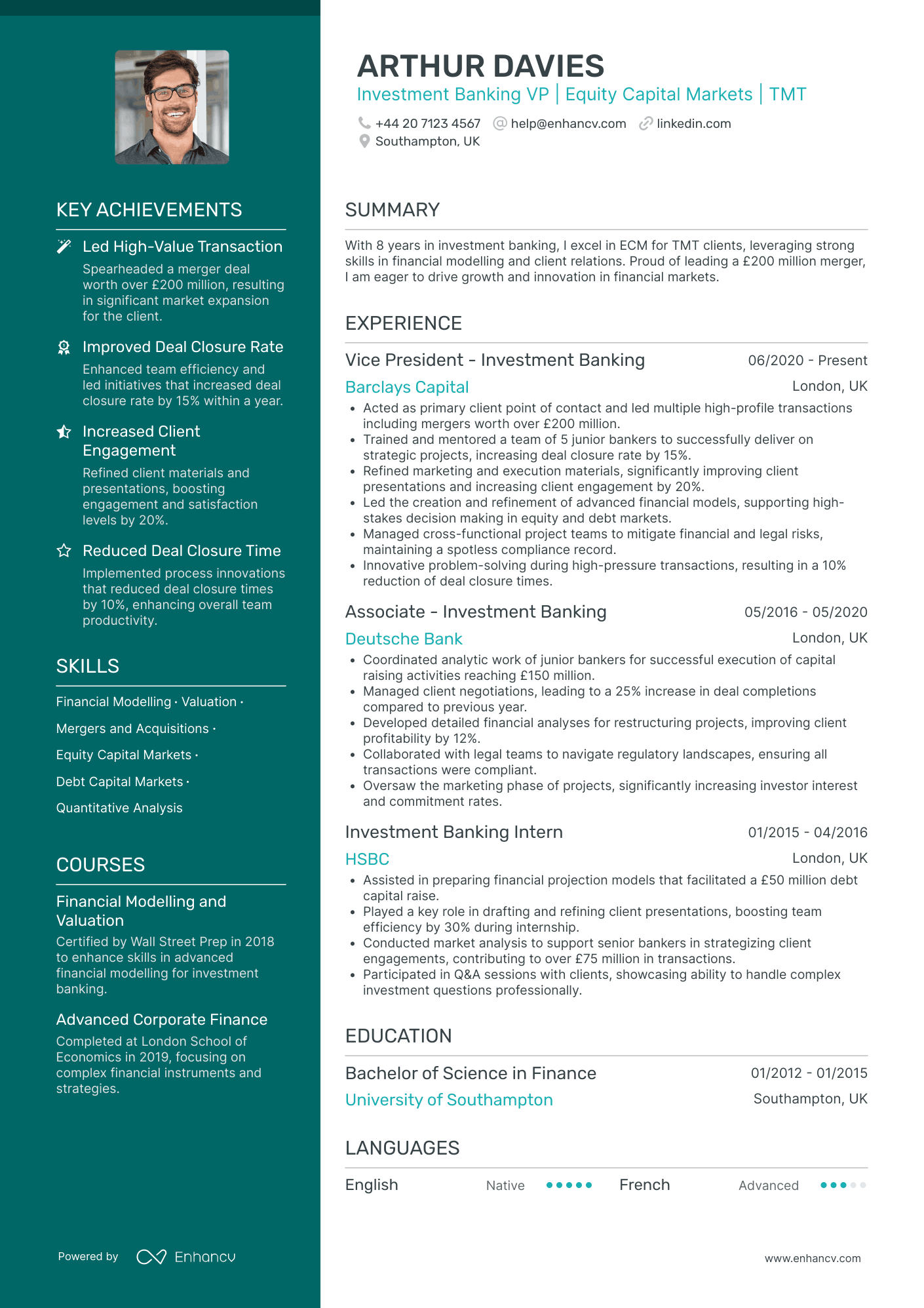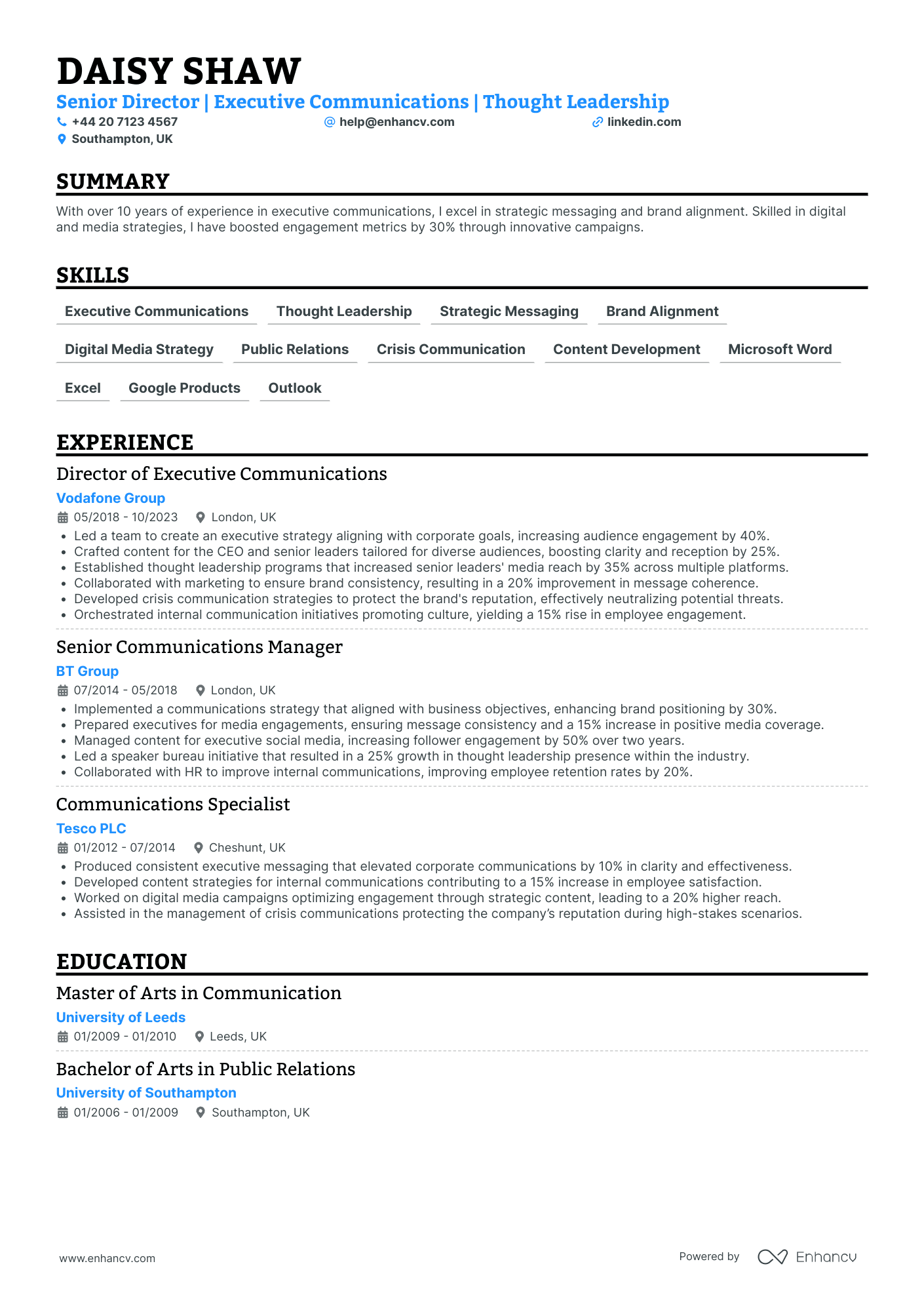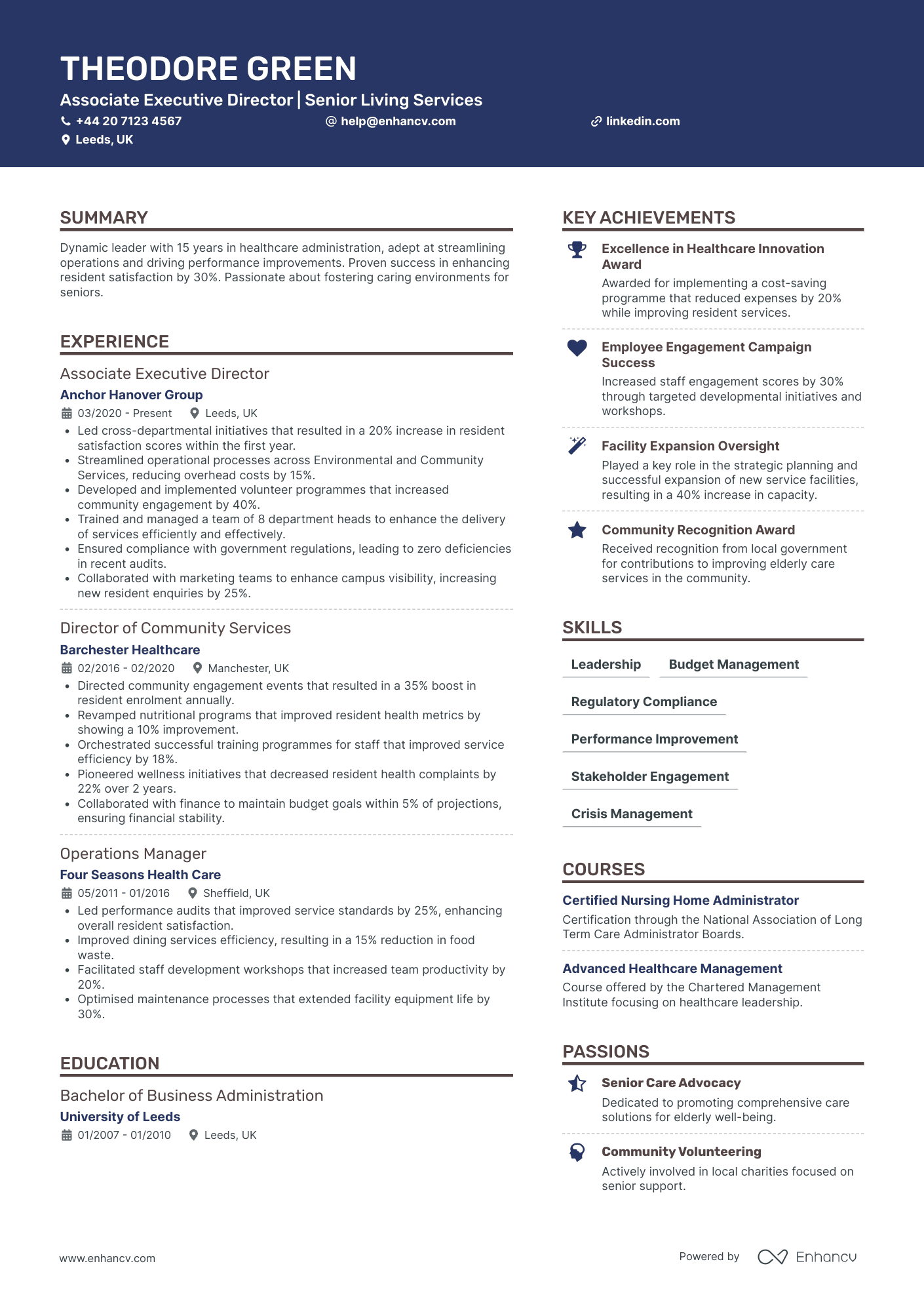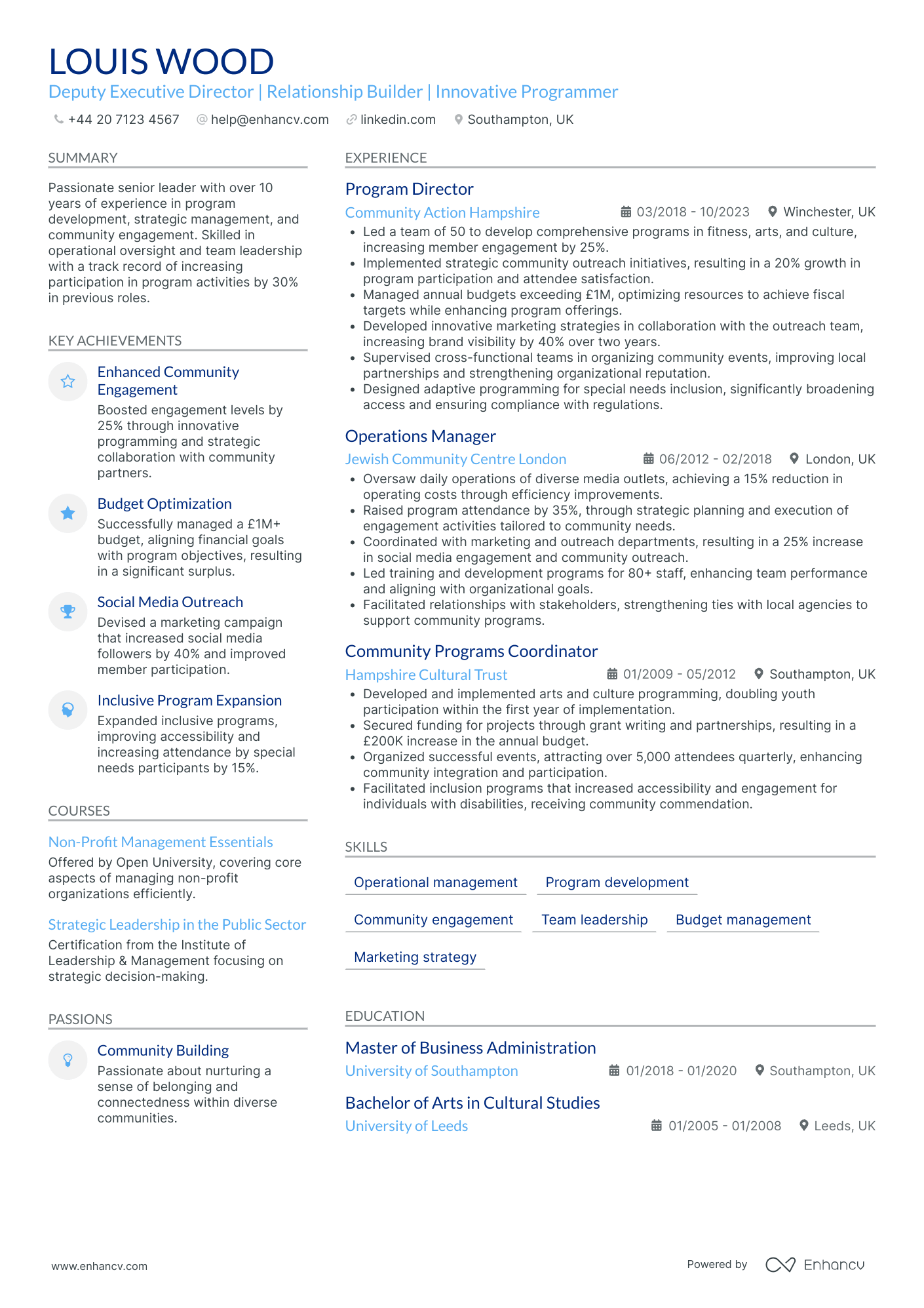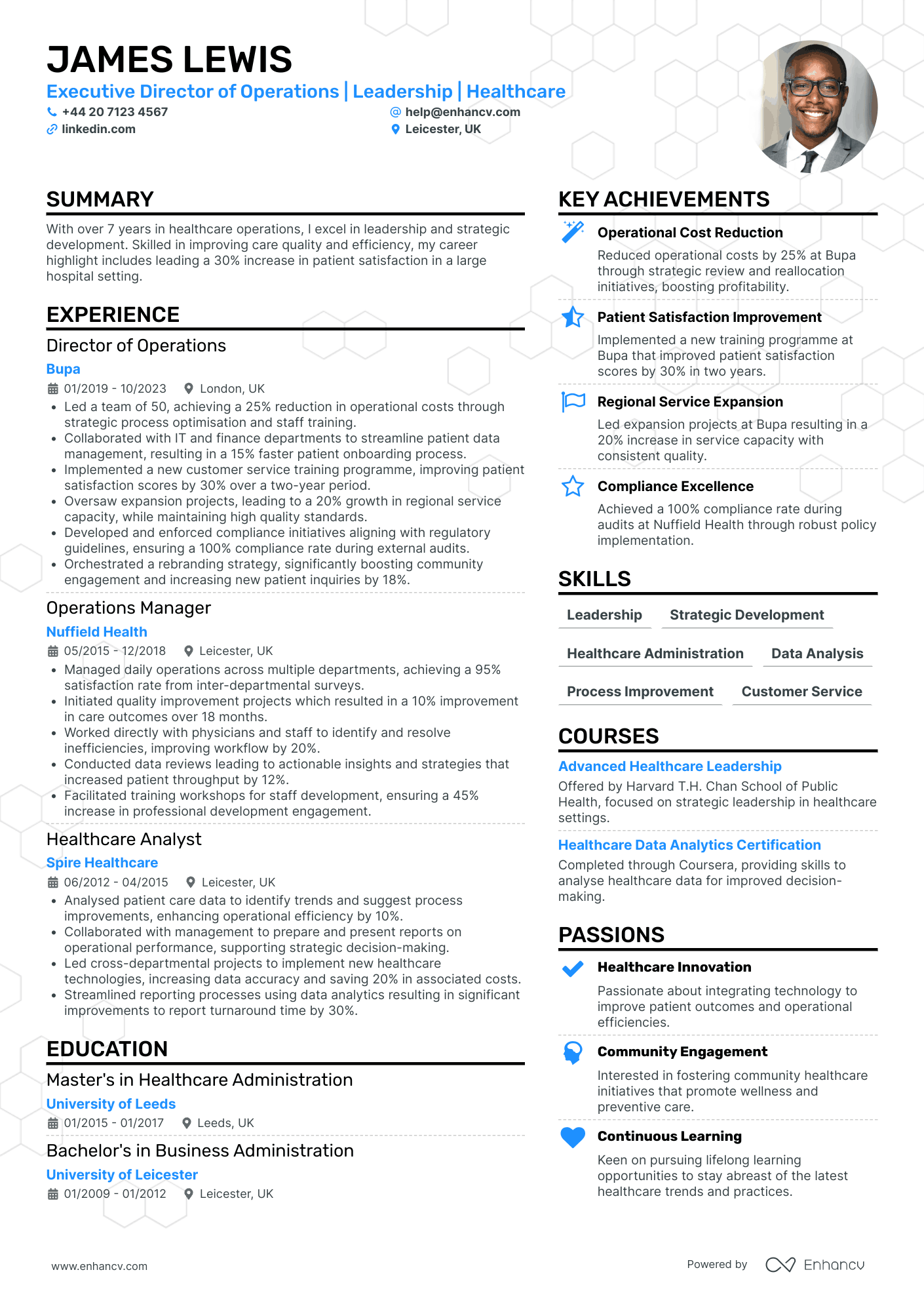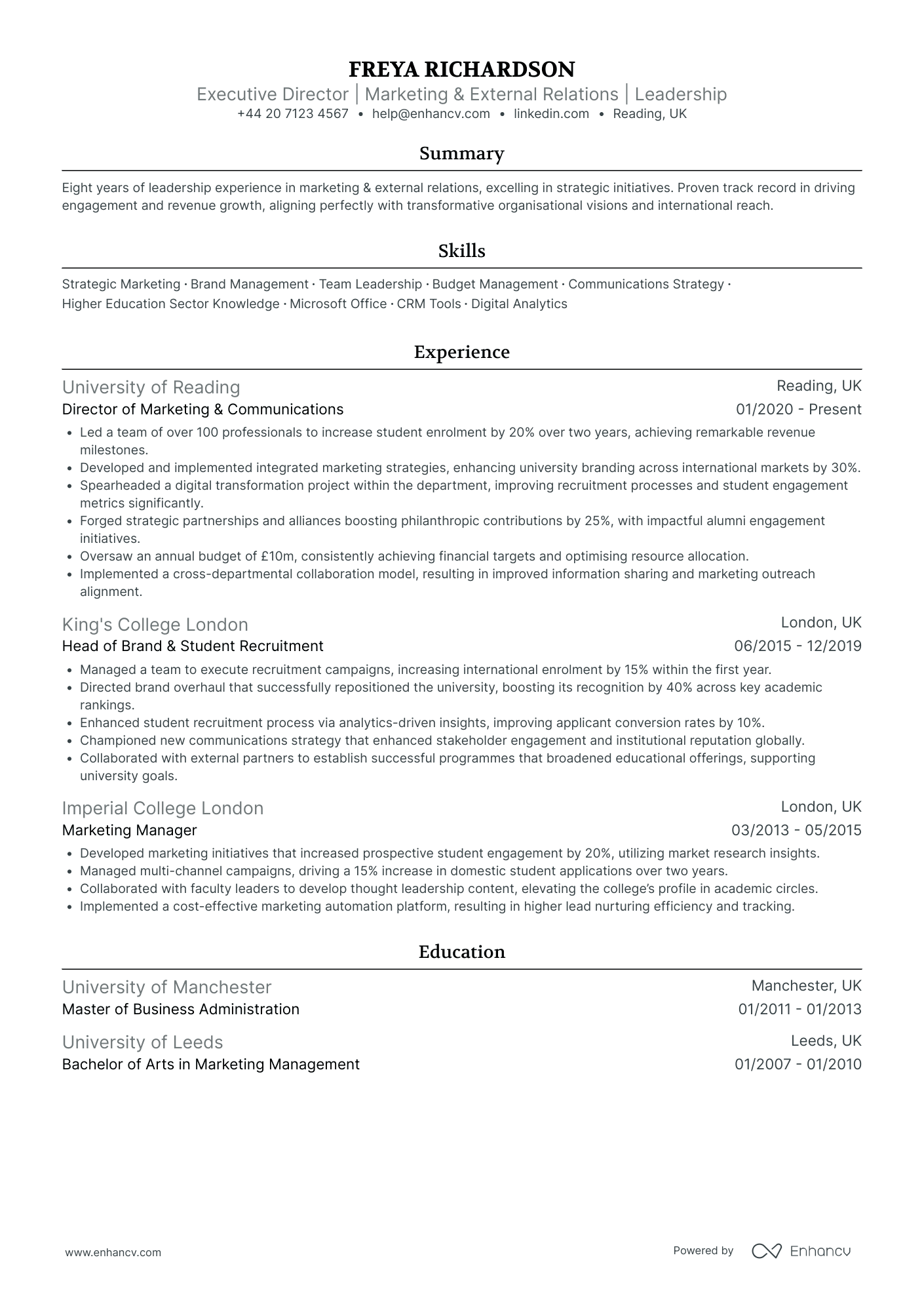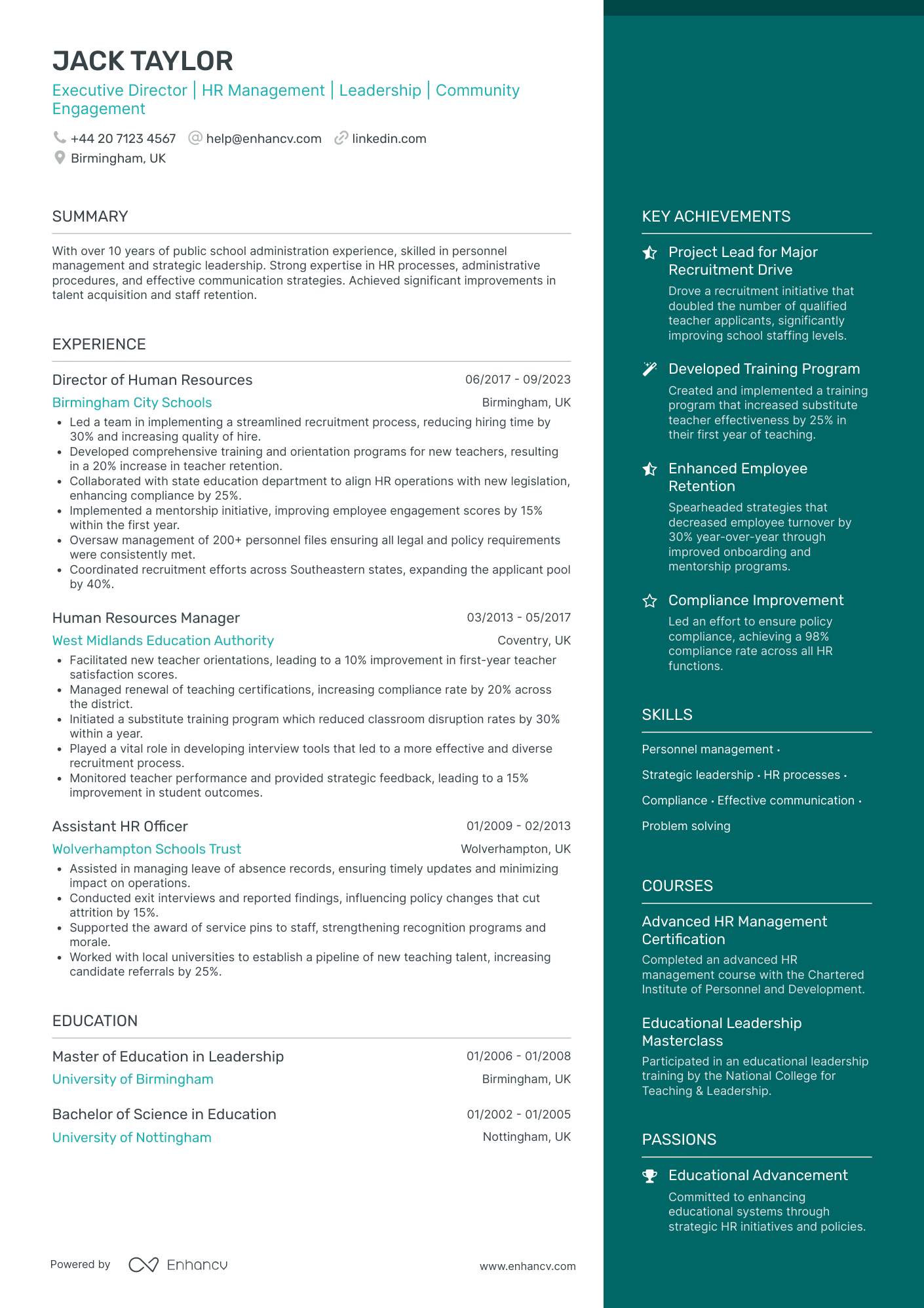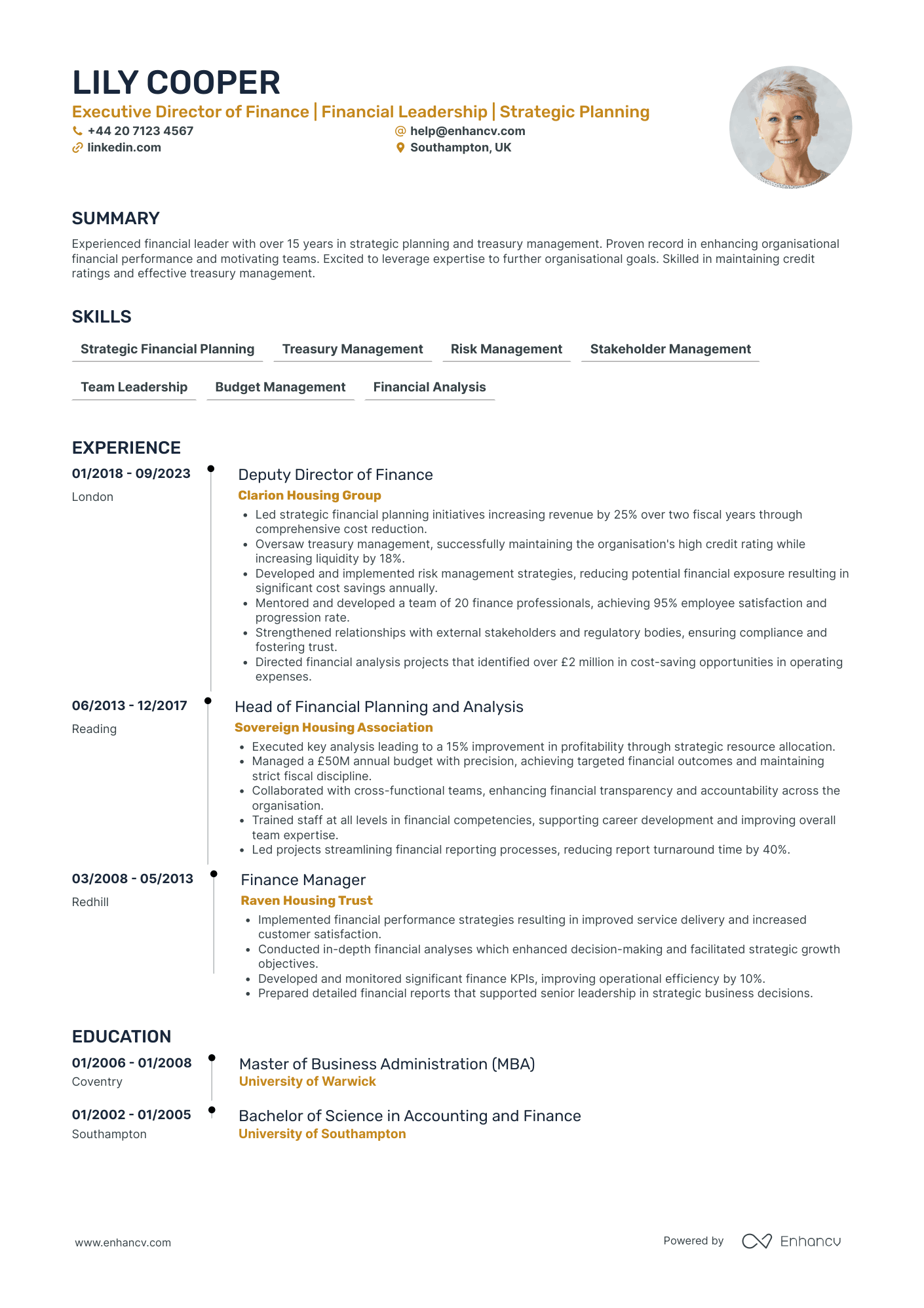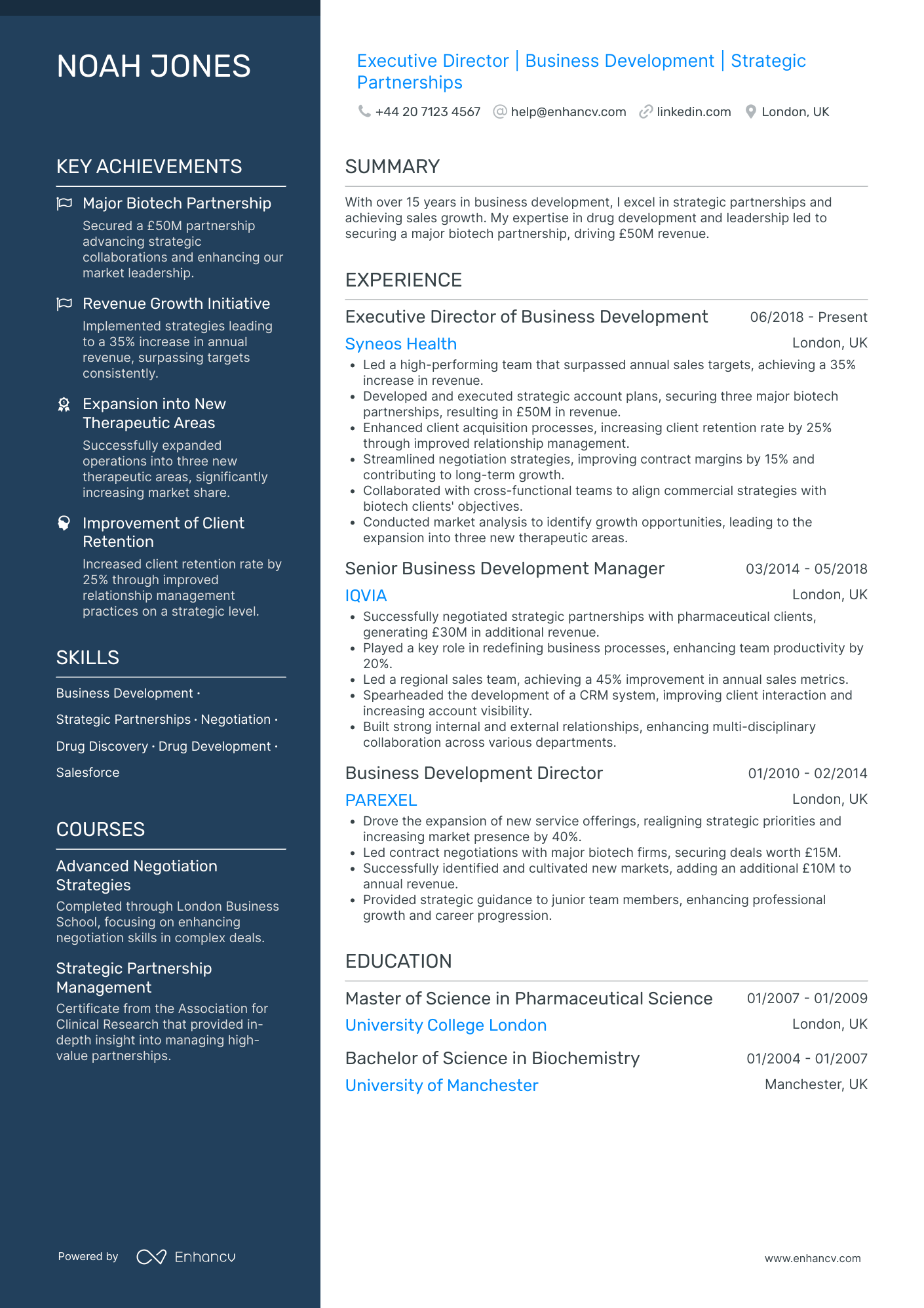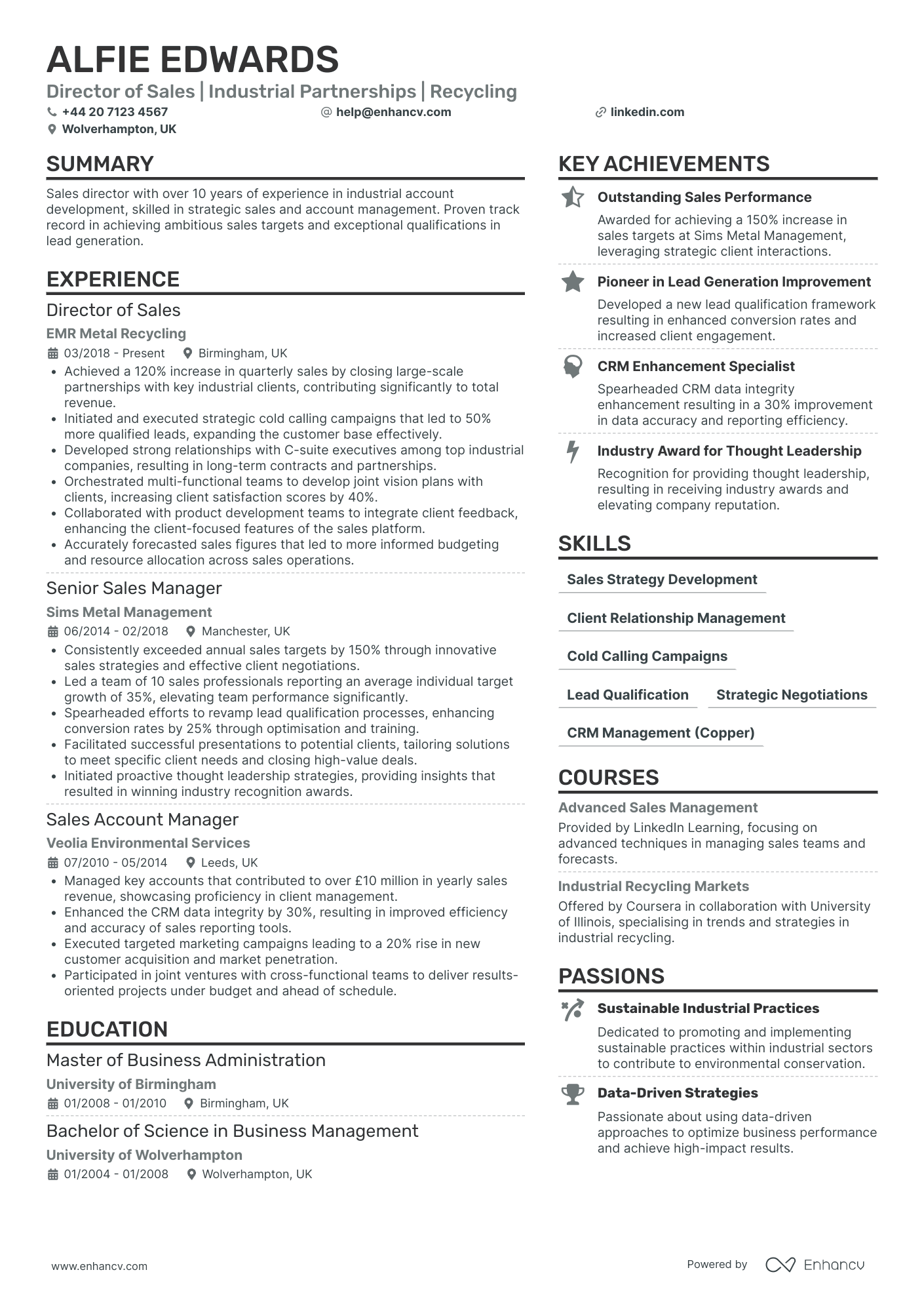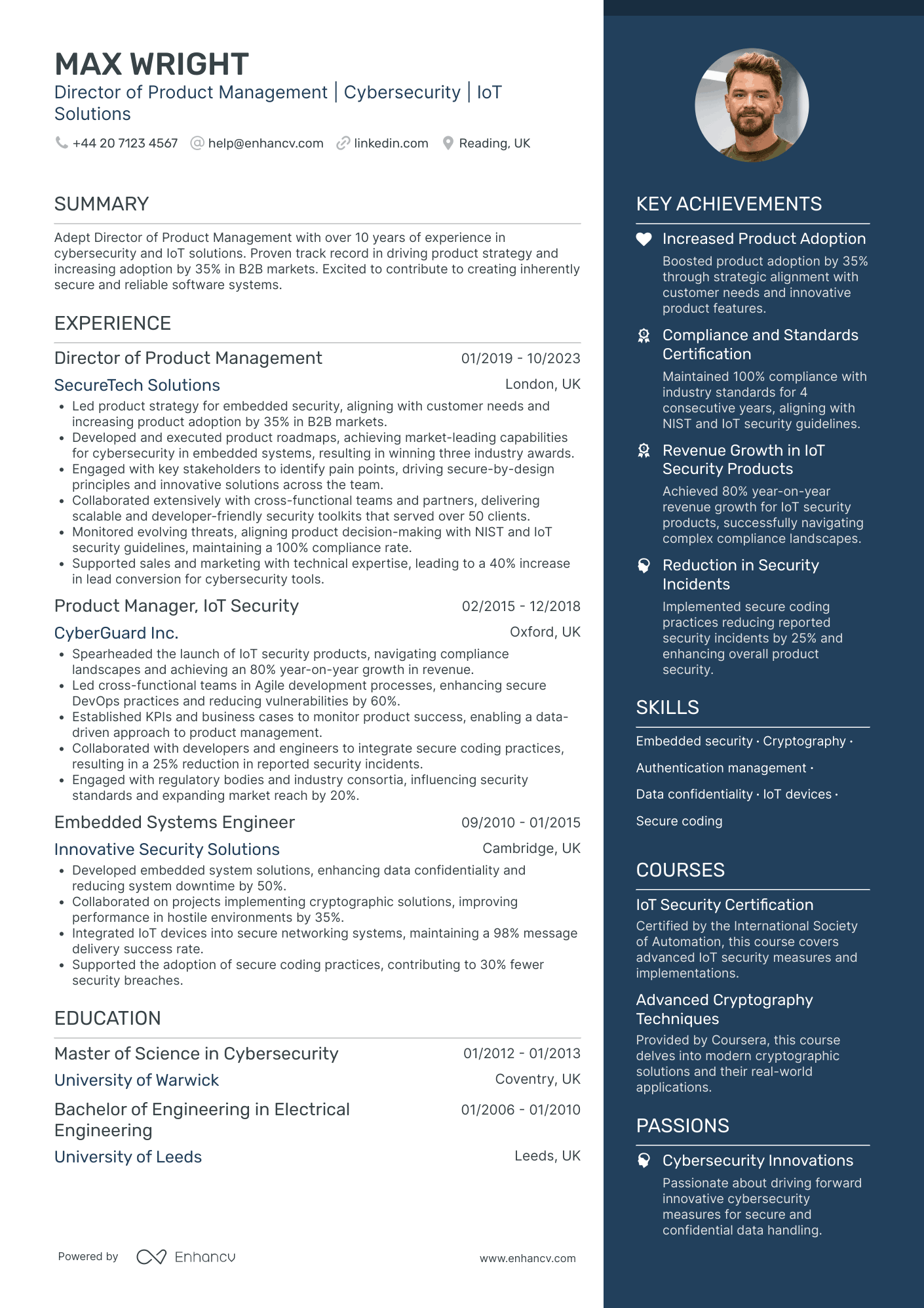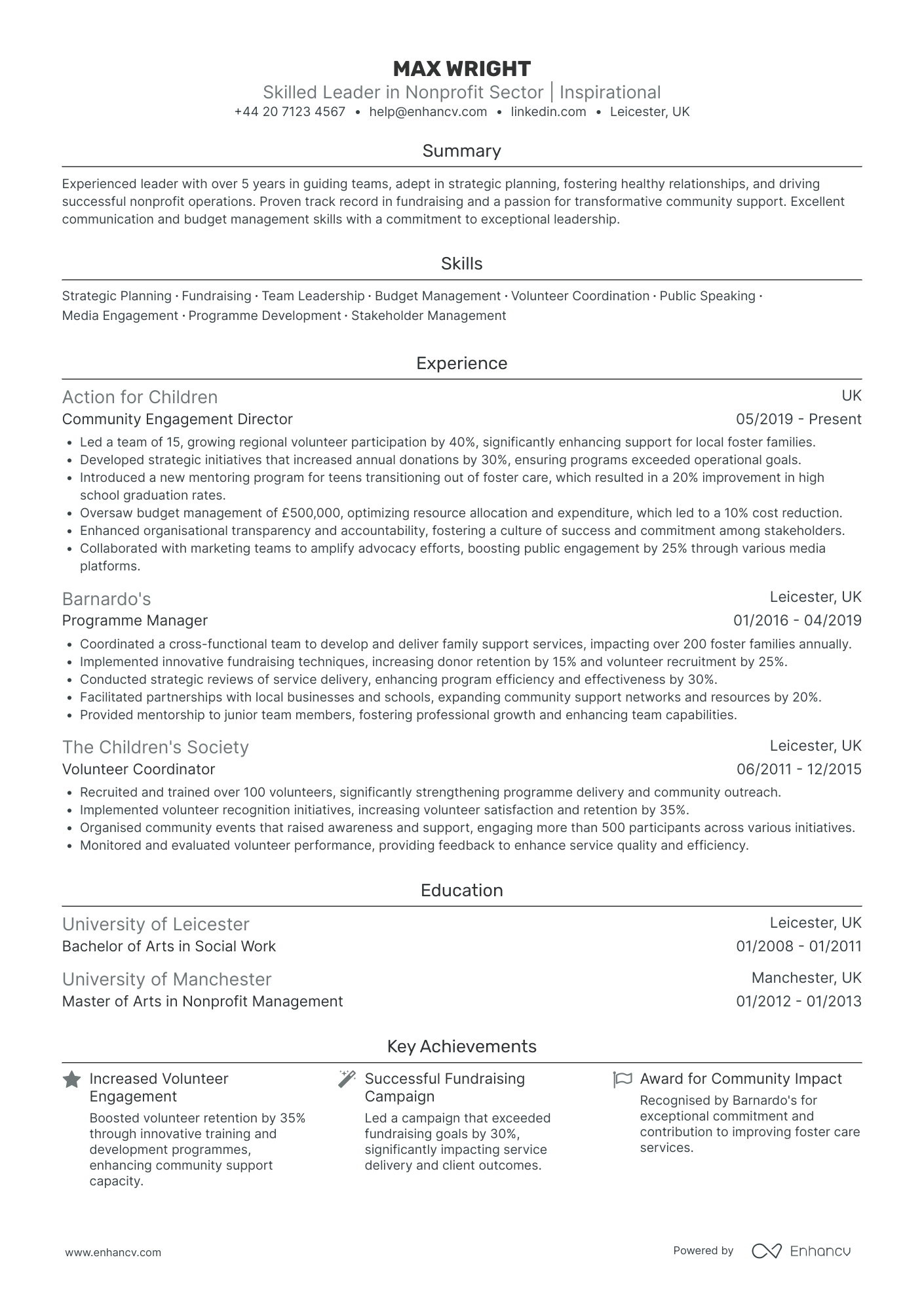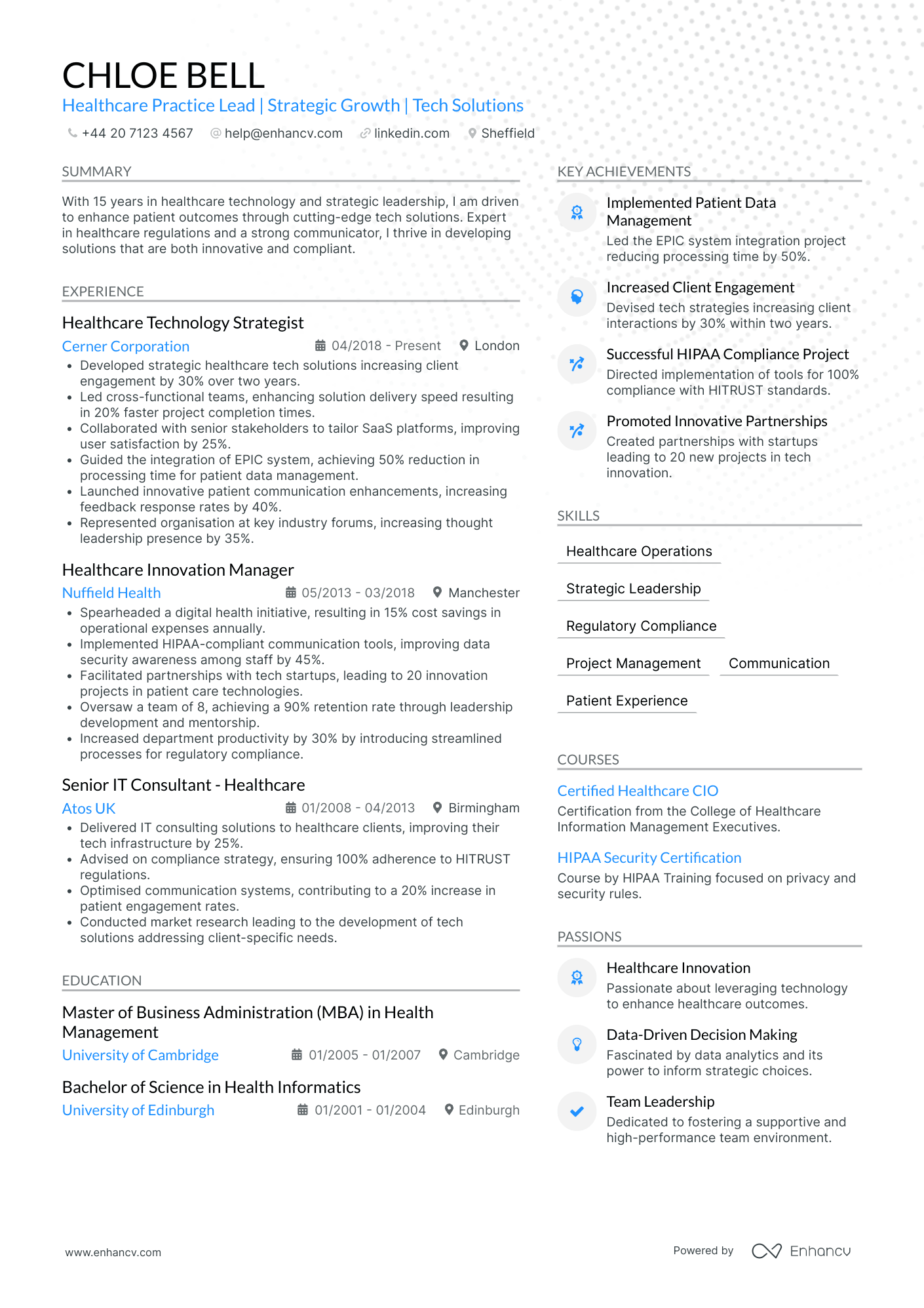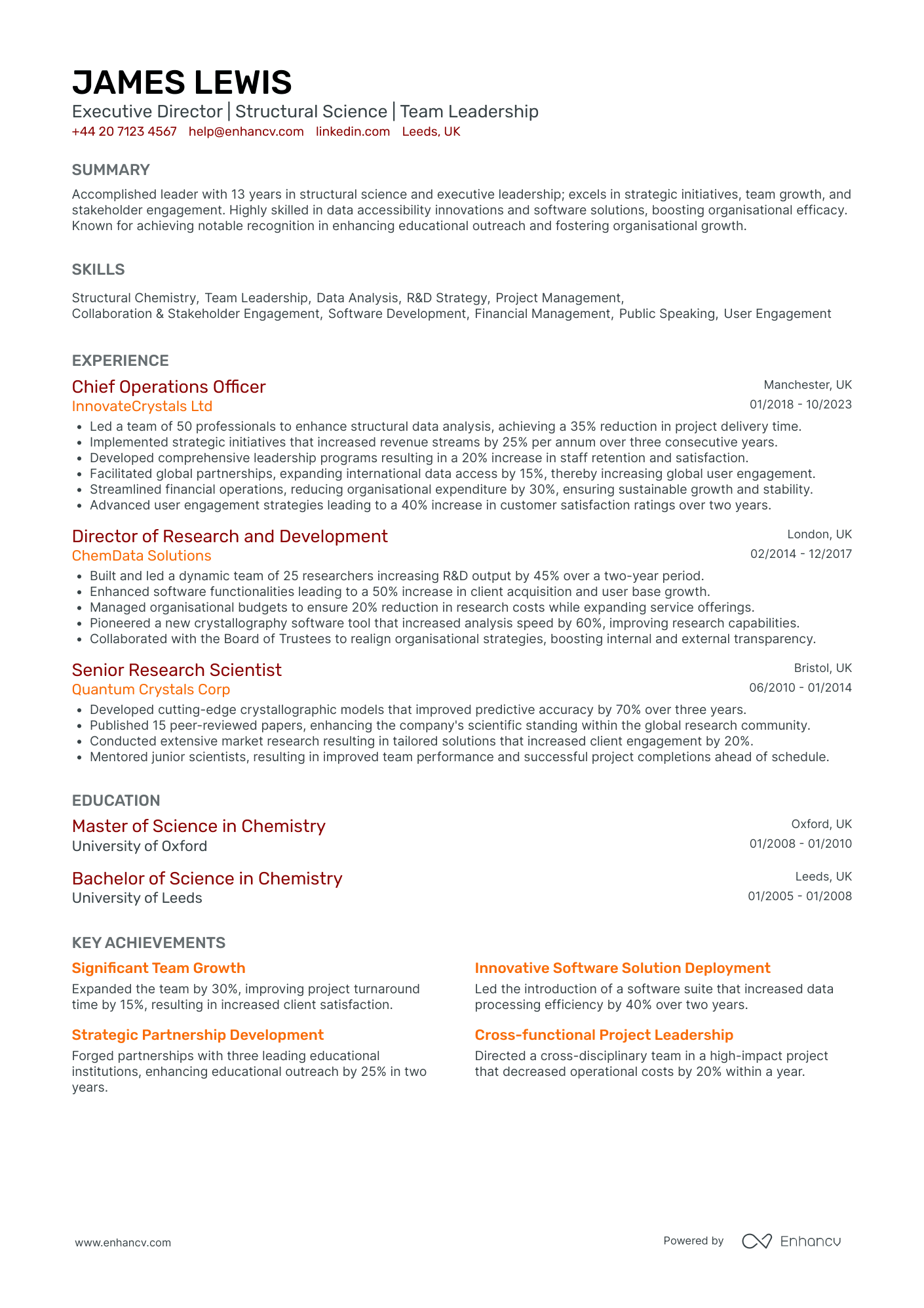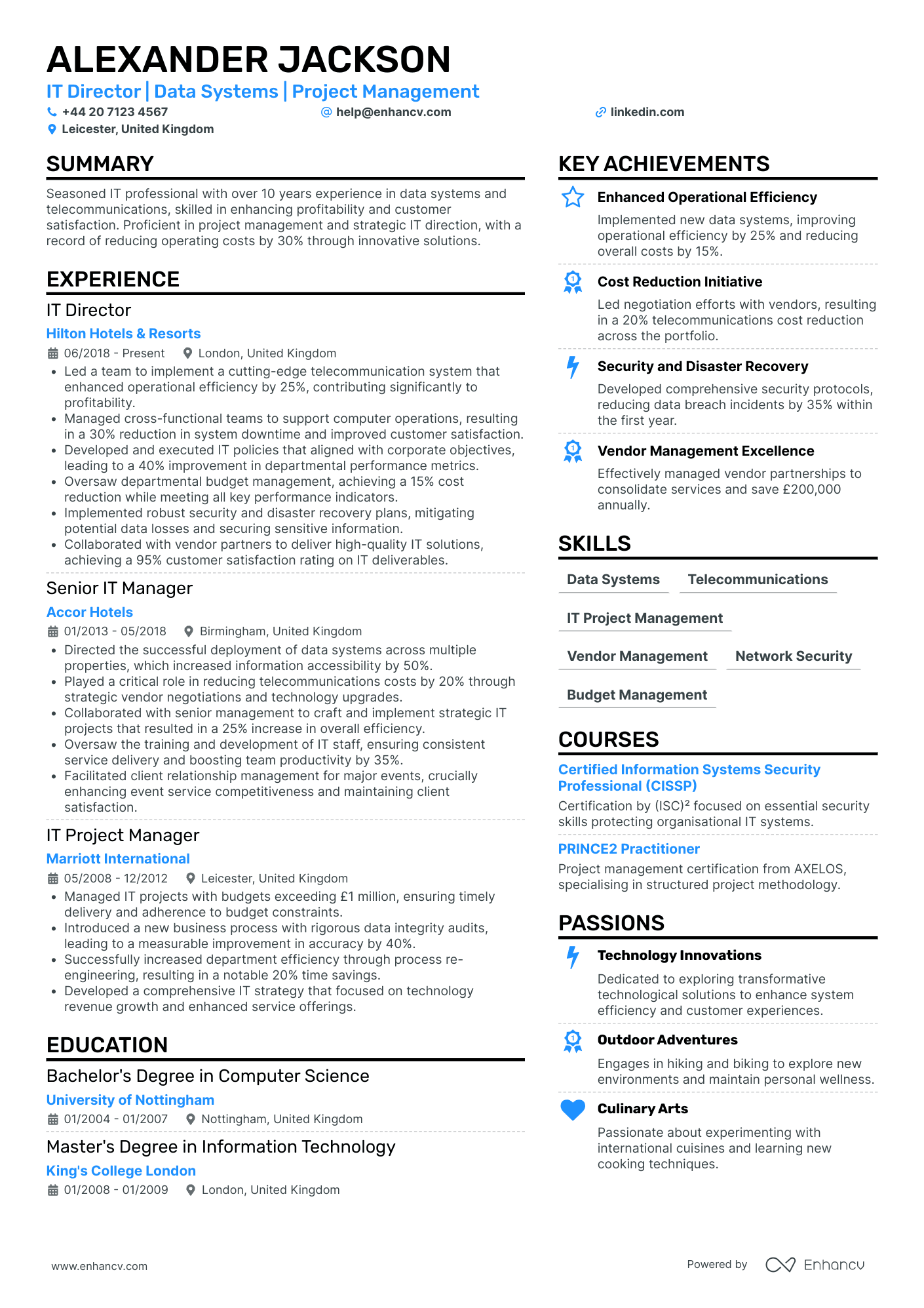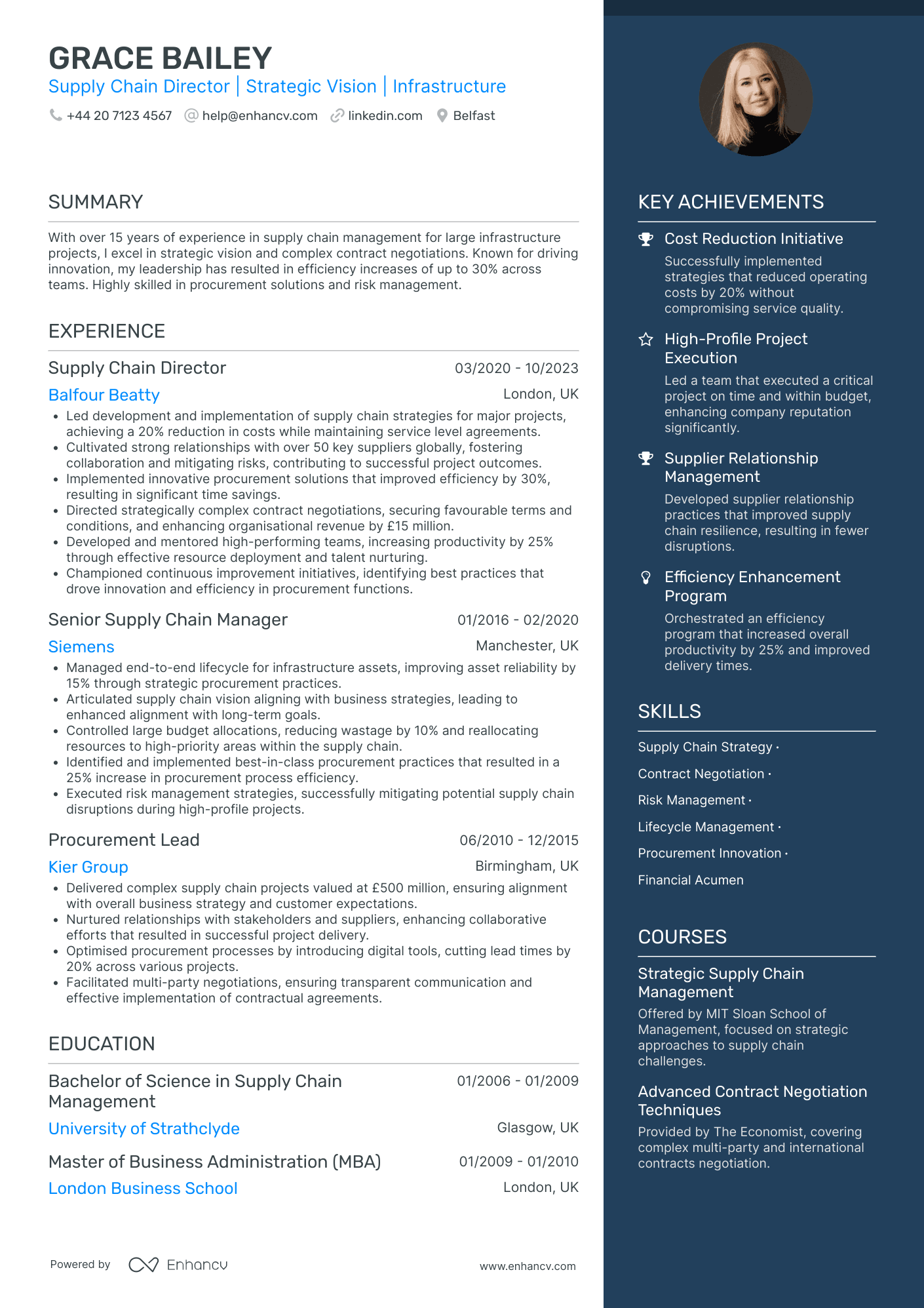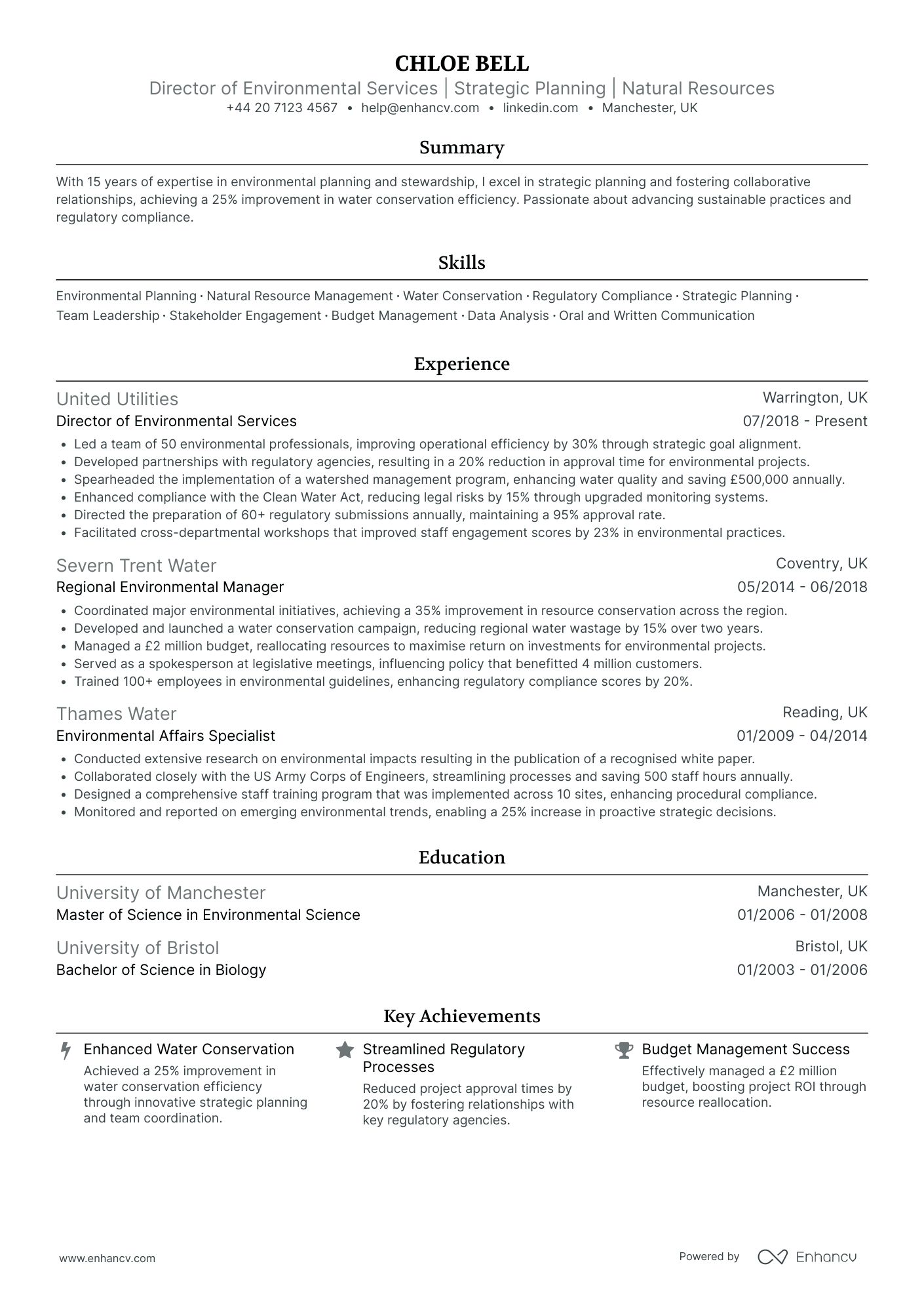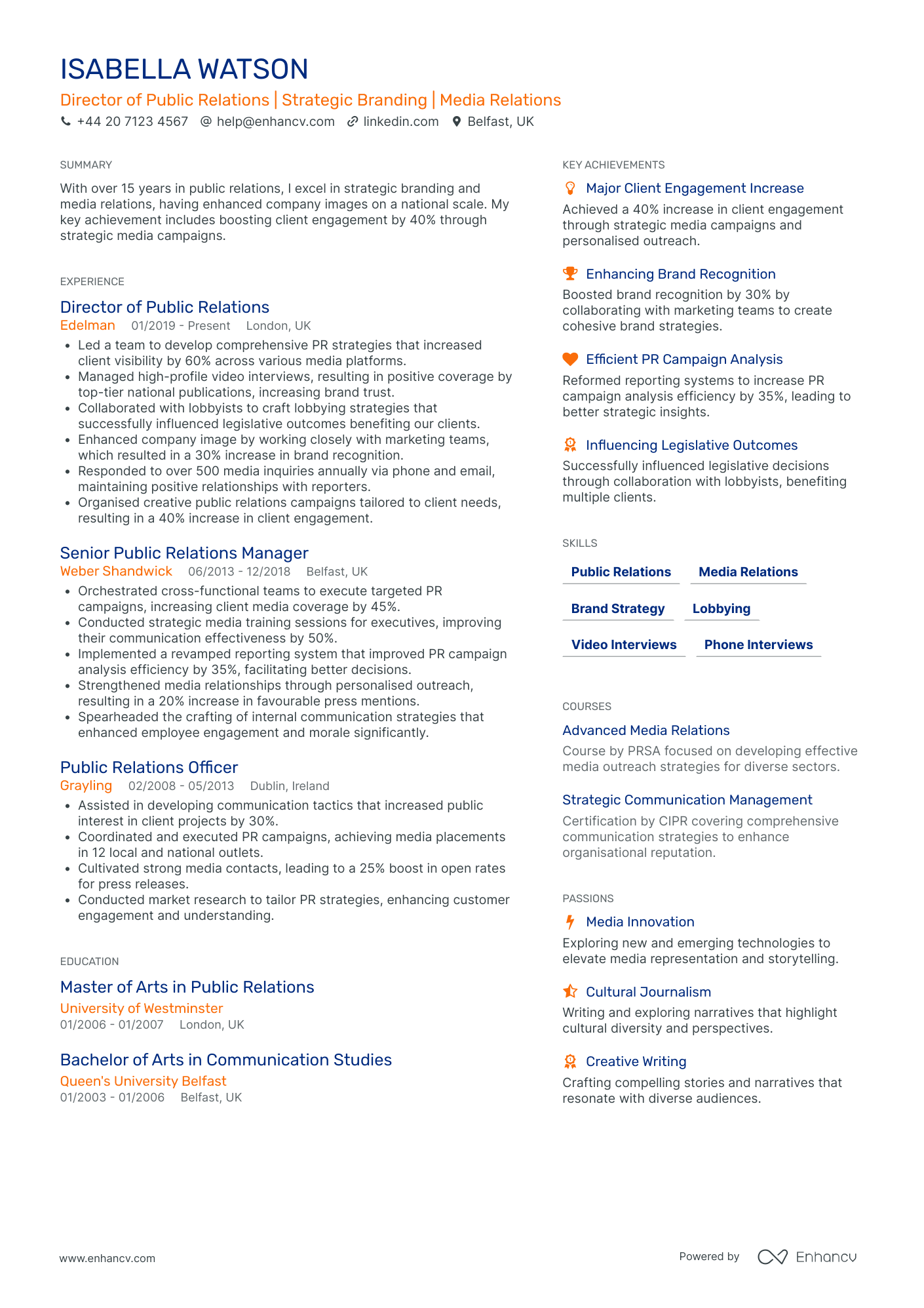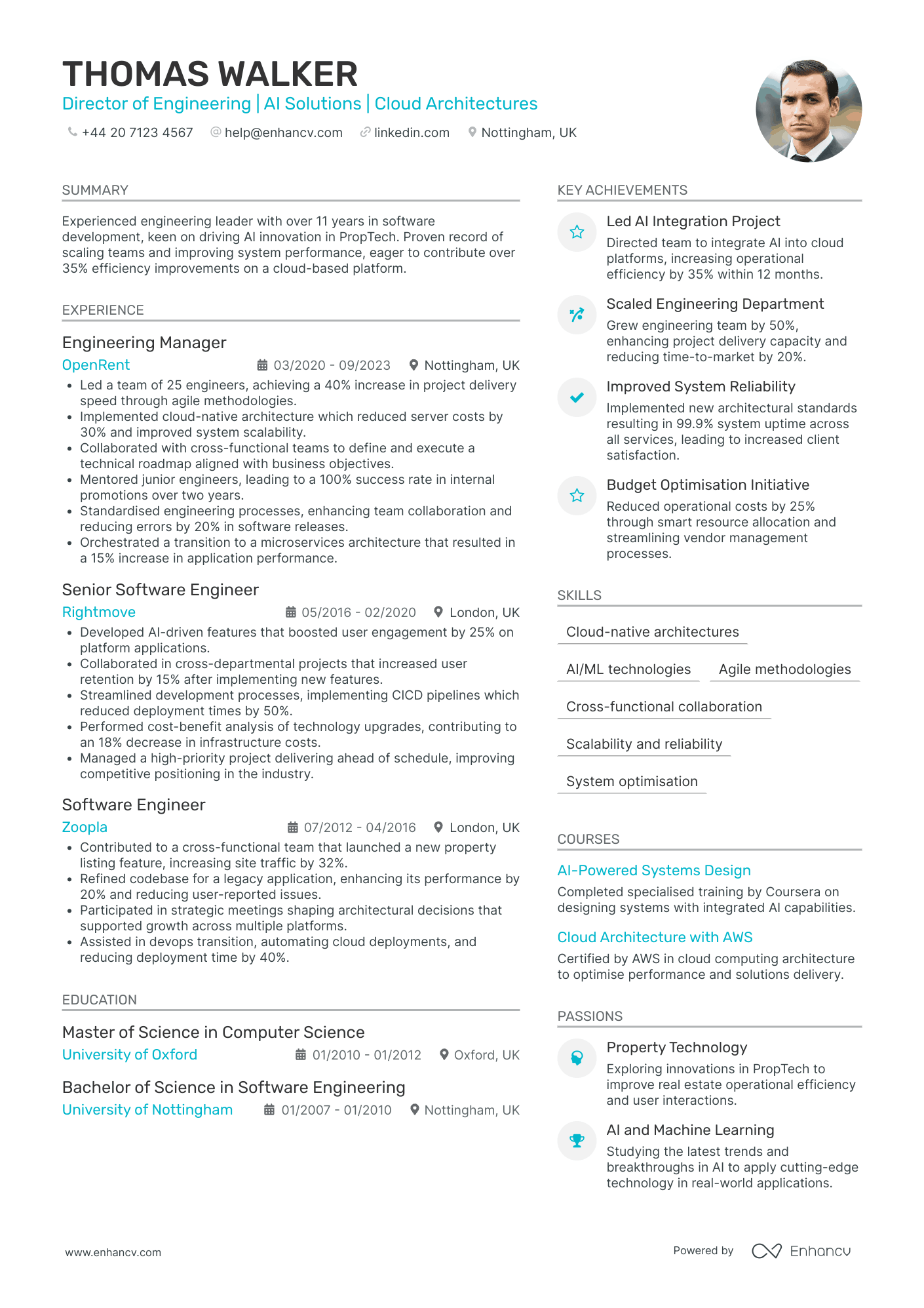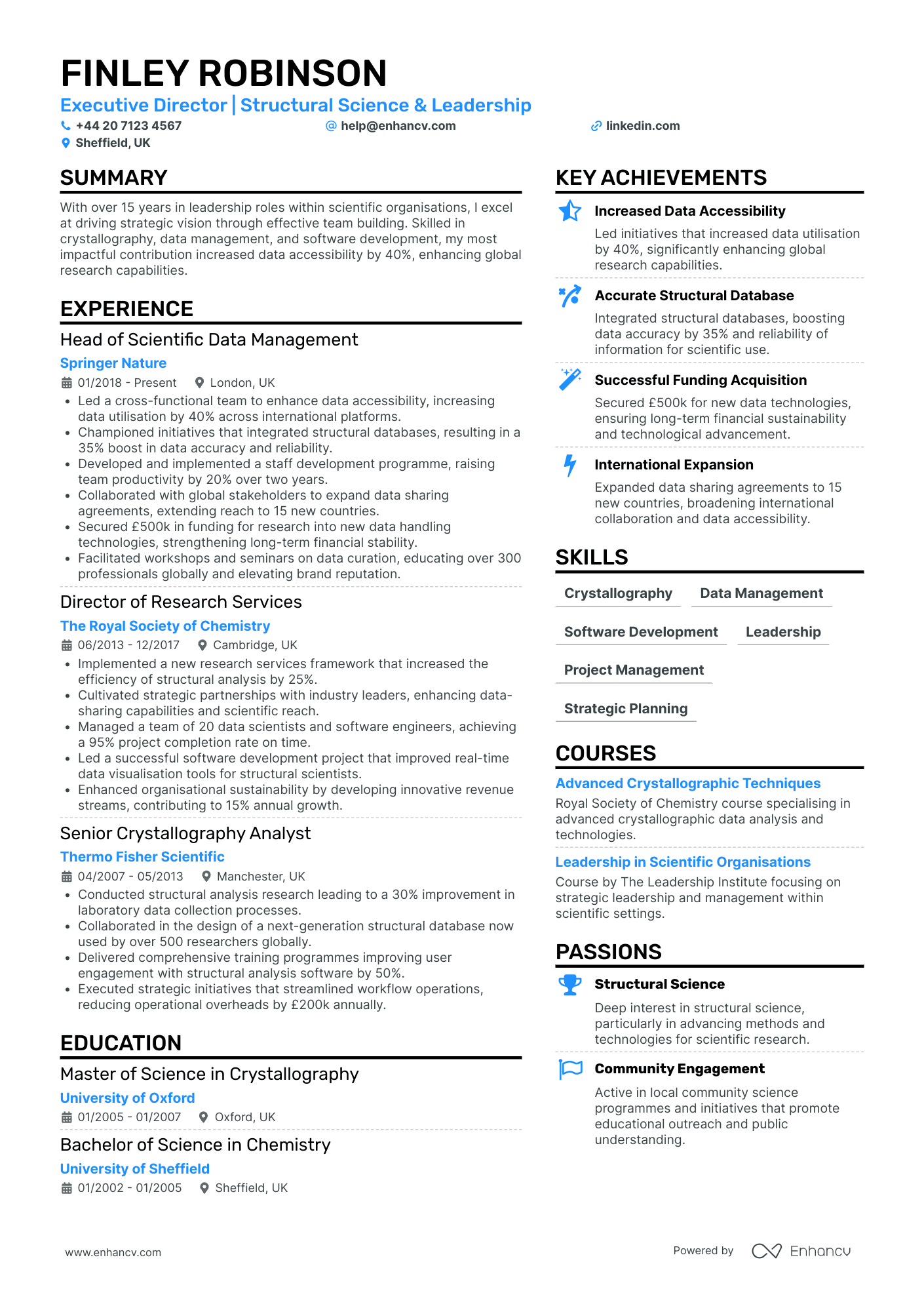Crafting a CV that aptly showcases your strategic leadership and organisational achievements can be an exacting challenge as an executive director. Our guide provides expert advice on how to effectively distil your extensive experience into a compelling narrative that highlights your executive prowess to prospective employers or boards.
- Create an attention-grabbing header that integrates keywords and includes all vital information;
- Add strong action verbs and skills in your experience section, and get inspired by real-world professionals;
- List your education and relevant certification to fill in the gaps in your career history;
- Integrate both hard and soft skills all through your CV.
Discover more industry-specific guides to help you apply for any role in the links below:
Resume examples for executive director
By Experience
Junior Executive Director
- Clear and Structured Presentation - The CV is impeccably organized, with clearly defined sections that make it easy to navigate through Arthur's experiences, skills, education, and achievements. Each section conveys pertinent information succinctly, reflecting a thoughtful layout that enhances readability and impact.
- Notable Career Progression - Arthur demonstrates a clear growth trajectory in the investment banking sector, moving from internships to a Vice President position within a relatively short time frame. This progression showcases strong dedication and the ability to rapidly ascend in a competitive industry, highlighting career achievements at reputable banks like Barclays and Deutsche Bank.
- Leadership and Mentoring Prowess - The CV effectively emphasizes Arthur's leadership abilities, detailing his role in training and mentoring junior bankers, which resulted in measurable improvements such as a 15% increase in deal closure rates. This focus on team development and effective management underscores his capability to lead in demanding environments and drive group success.
Senior Executive Director
- Strategic Clarity and Structure - The CV is impressively structured, with clear sections that effectively outline Daisy Shaw's career achievements and expertise. The use of bullet points under each experience entry ensures that key accomplishments and responsibilities are easily accessible, making the content both readable and engaging.
- Impressive Career Growth - Daisy Shaw’s career trajectory is notable for its clear path of advancement, moving from a Communications Specialist to a Senior Director role. This progression within high-profile organizations such as Vodafone and BT Group demonstrates her capability to excel and lead in executive communications.
- Significant Impact and Results - The CV stands out for its emphasis on measurable achievements, demonstrating Shaw's ability to drive business success. For instance, increasing audience engagement by 40% and boosting thought leadership presence by 25% clearly illustrate her effectiveness in enhancing brand visibility and strategic messaging.
Associate Executive Director
- Linear and Cohesive Career Growth - The CV outlines a clear and logical career progression within healthcare administration. Starting as an Operations Manager and leading up to the Associate Executive Director role, each position shows increased responsibility and a focus on improving resident satisfaction and operational efficiency.
- Effective Use of Quantifiable Achievements - Theodore Green’s CV is rich with quantifiable accomplishments. For example, it highlights a 30% increase in resident satisfaction and a reduction in overhead costs by 15%. These metrics not only give credibility but also demonstrate his direct impact on the organizations he has worked with.
- Industry-Specific Methodologies and Programs - The CV illustrates use of specific tools and methodologies pertinent to senior living services, such as volunteer programs to boost engagement, and wellness initiatives that have been methodically implemented to improve health outcomes. This reflects a nuanced understanding of the sector’s unique requirements.
Deputy Executive Director
- Highly Structured and Concise Presentation - The CV's clear structure effectively organizes each section, making it easy to navigate through Louis Wood's career trajectory and achievements. Each role is presented with detailed bullet points, reflecting accomplishments and the impact of responsibilities concisely.
- Commitment to Community and Cultural Engagement - Louis Wood showcases a robust trajectory focused on community and cultural programs. Progressing from a Community Programs Coordinator to Deputy Executive Director shows growth and dedication within community engagement and program development industries.
- Impactful Achievements with Measurable Outcomes - The CV emphasizes the impact of Louis’ roles through quantifiable achievements, such as a 25% increase in engagement, 20% growth in participation, and successful budget management. These figures highlight a strong alignment between operational activities and strategic outcomes.
By Role
Executive Director of Operations
- Structured and concise presentation - The CV is well-organized and concise, presenting the necessary information in an easy-to-digest format. Each section logically builds upon the other, enabling a reader to quickly understand James Lewis’s qualifications, experiences, and achievements in a clear and structured manner.
- Demonstrated leadership and strategic growth - James Lewis's career trajectory shows a clear progression from Healthcare Analyst to Executive Director of Operations, reflecting significant growth in leadership and responsibilities. This advancement within the healthcare industry demonstrates his ability to take on more complex challenges and lead larger teams successfully.
- Innovative approach to healthcare operations - The CV highlights James’s unique contributions to healthcare operations, such as leading cross-departmental projects and utilising data analytics to streamline processes. This blend of technical skills and strategic insight showcases his ability to implement forward-thinking solutions in the healthcare field.
Executive Director of Marketing
- Comprehensive Leadership Evidence - Freya Richardson's CV strongly showcases her leadership capabilities, highlighted by her role in leading a team of over 100 professionals and overseeing a substantial budget of £10 million. Her ability to implement strategic changes and achieve financial targets demonstrates her effectiveness in high-level management roles.
- Educational Relevance and Credentials - Freya’s academic background, with both a Master's in Business Administration and a Bachelor of Arts in Marketing Management, directly supports her career path in marketing and leadership within higher education. This educational foundation complements her career trajectory, reflecting a strong alignment of qualifications with industry demands.
- Significant Marketing Achievements - Her accomplishments, such as increasing student enrollment by 20% and enhancing university branding by 30%, emphasize the real-world impact of her marketing strategies. These achievements not only highlight her competency in executing effective marketing campaigns but also underscore her contribution to the financial growth and international presence of the institutions she has worked for.
Executive Director of Human Resources
- Structured and Clarity in Presentation - This CV is structured in a way that each section flows logically, making it easy for recruiters to digest the information quickly. The use of bullet points under every role clearly delineates responsibilities and accomplishments, optimizing clarity and brevity.
- Impressive Career Trajectory - Jack Taylor's career path showcases a consistent upward mobility within the education sector, moving from an Assistant HR Officer to Director of Human Resources. This progression reflects a deepening of expertise and expanded responsibility, illustrating a strong leadership potential and a commitment to professional growth within one industry.
- Significant Achievements with Business Relevance - The CV highlights specific achievements that demonstrate Jack's ability to impact business outcomes positively, such as reducing hiring time by 30% and increasing teacher retention by 20%. These accomplishments not only showcase proficiency in HR management but also indicate a strategic approach to staff development and resource optimization.
Executive Director of Finance
- Structured Presentation of Content - The CV is methodically organized with each section clearly delineating Lily Cooper's professional milestones and strengths. It maintains conciseness yet includes comprehensive information relevant to her extensive financial leadership career, ensuring ease of navigation and audience engagement.
- Career Growth and Strategic Leadership - Lily's career trajectory illustrates a steady progression from Finance Manager to Executive Director of Finance, showcasing her growing impact and leadership capabilities within the housing sector. The upward mobility highlights her strategic acumen and ability to adapt to increasing responsibilities and complexities in financial management.
- Impact-Driven Achievements - The CV emphasizes business-relevant accomplishments, such as increasing liquidity by 18% and generating cost savings through risk management. These achievements not only showcase Lily's technical skills but also reflect her capacity to align financial strategies with broader organizational goals, driving sustainable growth and stability.
Executive Director of Business Development
- Comprehensive Leadership and Strategic Vision - Noah's CV brilliantly illustrates an upward career trajectory with progressive leadership roles. From his beginnings as a Business Development Director to his current position as an Executive Director, the trajectory showcases a history of strategic thinking and leadership in driving business growth and partnerships.
- Evidence of Significant Industry Contributions - The achievements section is particularly impactful, as it not only presents quantifiable results like securing a £50M biotech partnership but also contextualizes this within broader market leadership and strategic growth. Such accomplishments signify not just proficiency but a transformative impact within the biotech industry.
- Diverse Skill Set Highlighting Core Competencies - The CV carefully balances between technical and soft skills such as Negotiation, Drug Discovery, Leadership, and CRM Management. It presents these skills in relation to actual outcomes and success stories, providing a holistic picture of the candidate's capacity to deliver in the dynamic landscape of business development and strategic partnerships.
Executive Director of Sales
- Clear Structure and Conciseness - The CV is well-organized, beginning with a succinct summary that concisely outlines Alfie Edwards' extensive expertise in sales and recycling. It provides a structured layout with clear headings for sections like "Experience," "Education," and "Skills," making the document easily navigable, which ensures that the reader can readily find critical information.
- Demonstrated Career Growth and Industry Focus - Alfie's career trajectory reflects a steady upward progression, having advanced from a Sales Account Manager to the Director of Sales. Each subsequent role illustrates a clear step up in responsibility and a deeper focus within the industrial recycling sector, showcasing a commitment to vertical industry expertise alongside personal professional growth.
- Industry-Specific Methodologies and Achievements - The CV emphasizes industry-specific skills such as strategic negotiations, lead qualification, and CRM management with a focus on recycling markets. Alfie’s achievements, such as increasing sales targets by 120% and enhancing CRM data integrity by 30%, highlight his impact on business success, combining technical expertise with quantifiable business outcomes.
Executive Director of Product Management
- Strategic Career Progression - Max Wright's CV excellently outlines a clear career trajectory marked by a steady rise from an Embedded Systems Engineer to a Director of Product Management. Each role demonstrates growth in both responsibility and influence within the cybersecurity and IoT solutions industries. This progression not only validates his expertise but also underscores his capability to adapt and excel in increasingly complex and strategic roles.
- Deep Expertise in Cybersecurity and IoT - The CV showcases a deep industry-specific proficiency, particularly in cybersecurity and IoT, utilizing tools such as embedded security, cryptography, and secure DevOps. These technical skills are backed by practical successes like system downtime reduction and enhanced performance in hostile environments, which illustrate Wright's ability to apply his technical knowledge to tangible business outcomes.
- Balance of Technical and Interpersonal Skills - Beyond technical expertise, the CV highlights Max Wright’s ability to lead, collaborate, and communicate across functions. His roles have involved extensive cross-functional collaboration, stakeholder engagement, and strategic leadership, demonstrating a blend of hard and soft skills necessary to drive projects and teams in tech-focused environments.
Executive Director of Nonprofit
- Clear and Concise Content Presentation - This CV is structured for clarity and impact, with well-defined sections that enable quick navigation. The information is presented concisely yet comprehensively, focusing on key achievements and skills relevant to the nonprofit sector, ensuring that potential employers can easily grasp the candidate's qualifications and impact.
- Career Trajectory and Sector Commitment - Max Wright's career path illustrates a steady progression within the nonprofit sector, moving from Volunteer Coordinator to Community Engagement Director. This demonstrates a commitment to the field and showcases the candidate’s leadership development and growing responsibility over time, highlighting their readiness for senior roles in nonprofit leadership.
- Achievements with Significant Community Impact - The CV highlights achievements that go beyond numbers, emphasizing their real-world impact. For instance, initiatives like the mentorship program for teens transitioning out of foster care have tangible benefits, such as improving educational outcomes by 20%, reflecting a dedication to meaningful community support and societal betterment.
Executive Director of Healthcare Services
- Clarity and Structured Content Presentation - The CV is meticulously organized with distinct sections such as experience, education, skills, and certifications, which make it easy to navigate. Each section is clearly labeled and the use of bullet points helps in maintaining a concise format, ensuring key achievements and responsibilities are highlighted effectively without overwhelming detail.
- Career Growth and Industry Shifts - The candidate exhibits a natural progression in their career, moving from roles with an IT consultancy focus to leadership positions in healthcare technology. This trajectory underscores a growing responsibility and expertise in the healthcare sector, highlighting adaptability and a continuous pursuit of roles that integrate technology with healthcare improvement.
- Unique Industry-Specific Elements - The CV distinguishes itself with specialized skills in healthcare technologies, such as Epic Systems and Cerner, emphasizing proficiency in industry-critical platforms. Additionally, it references compliance with key healthcare regulations like HIPAA and HITRUST, demonstrating deep industry-specific technical knowledge crucial for a leadership role in healthcare technology.
Executive Director of Educational Services
- Impressive career trajectory - The CV showcases a clear upward trajectory through strategic roles, indicating growth from a Senior Research Scientist to Executive Director. Each position held has seen an escalation in responsibility, reflecting the candidate's evolving expertise and leadership capabilities in structural science.
- Achievements with substantial impact - The candidate's past achievements are not only quantified but also demonstrate business relevance. For instance, expanding a team by 30% led to a 15% improvement in project turnaround time and increased client satisfaction, illustrating the profound impact of effective team management on business success.
- Combination of technical and soft skills - The document highlights a rare blend of both technical prowess in structural chemistry and soft skills like team leadership and public speaking. This duality positions the candidate as not just a technical expert but also as a strategic leader capable of steering organizational direction.
Executive Director of Information Technology
- Clarity in Content Presentation - The CV is structured in a clear and concise manner, making it easy to follow Alexander Jackson's progression in the IT field. Each section is carefully laid out, with bulleted lists in the experience section that succinctly capture key responsibilities and achievements, ensuring that readers can quickly understand the candidate's qualifications and contributions.
- Significant Career Growth and Strategic Leadership - Alexander's career trajectory is marked by continuous growth, moving from an IT Project Manager role at Marriott International to an IT Director at Hilton Hotels & Resorts. This progression not only highlights his rise in leadership, but also underscores his ability to manage increasingly complex IT environments, reflecting his strategic vision and management prowess.
- Impactful Achievements with Business Relevance - The achievements described in the CV demonstrate Alexander's ability to drive substantial business impact, with specific numbers illustrating operational improvements and cost reductions. For instance, his leadership in cost reduction initiatives resulted in a significant 20% reduction in telecommunications expenses, showcasing his financial acumen and value to the organization's bottom line.
Executive Director of Supply Chain
- Impressive Career Progression and Leadership - Grace Bailey’s career trajectory is marked by significant promotions and enhanced responsibilities, displaying a clear path from Procurement Lead to Supply Chain Director. Her progression highlights not only her ability to manage increasingly complex supply chains but also her capacity to lead and inspire teams across major companies like Balfour Beatty and Siemens.
- Quantitative Achievements Driving Business Success - The CV presents a compelling narrative of achievements, showcasing a track record of impactful results, such as a 20% cost reduction and a £15 million revenue increase. These accomplishments are tied directly to her strategic decisions, demonstrating not just numerical prowess but also the positive effect on the company's bottom line.
- Commitment to Innovation and Continuous Improvement - A core aspect of Grace’s professional profile is her dedication to driving innovation. She has leveraged her expertise to implement procurement solutions that led to a 30% efficiency improvement and optimised digital tools, enhancing procurement processes and cutting lead times. Her focus on innovation underscores a forward-thinking approach crucial for modern supply chain management.
Executive Director of Environmental Services
- Clear and Effective Presentation - The CV is well-structured, with each section clearly delineated. It concisely presents the candidate's professional journey, making it easy to follow. Bullet points in the experience section emphasize key achievements and responsibilities, allowing for quick comprehension of the candidate's capabilities and contributions.
- Strategic Career Growth - Chloe Bell's career trajectory demonstrates a clear path of upward mobility, starting from an Environmental Affairs Specialist to becoming the Director of Environmental Services. This progression showcases her dedication and the continuous accumulation of relevant skills and responsibilities. Her movement across different leading water and environmental service companies shows versatility and a commitment to the industry.
- Achievements with Significant Business Impact - The achievements detailed in the CV are not merely figures but reflect a broader business impact. For instance, a 25% improvement in water conservation efficiency is linked to strategic planning and team coordination, demonstrating her ability to influence large-scale operational outcomes. Additionally, influencing policy that affects 4 million people underscores her significant impact on environmental governance and community welfare.
Executive Director of Public Relations
- Clear and Structured Presentation - The CV presents information in a clear and concise manner, with distinct sections for experience, education, skills, and achievements. This organized format allows readers to quickly grasp Isabella Watson's qualifications and career trajectory, enhancing the CV's effectiveness.
- Evidence of Career Growth - Isabella’s career trajectory demonstrates a clear path of growth, moving from a Public Relations Officer to a Director of Public Relations. This upward movement indicates her ability to take on more responsibility and succeed in increasingly complex roles within the industry.
- Industry-Specific Expertise and Tools - The CV highlights Isabella's proficiency in strategic branding and media relations, reinforced by specialized courses like "Advanced Media Relations" and "Strategic Communication Management." These show her dedication to continuous improvement and staying abreast of industry advancements.
Executive Director of Engineering
- Comprehensive Career Growth - Thomas Walker's CV displays a clear and dynamic career trajectory, showcasing his ascent from Software Engineer roles to Senior positions, culminating in his current role as Director of Engineering. This progression demonstrates his continuous growth and increased responsibilities across notable companies, indicating a strong capability to expand his influence and leadership within the tech industry.
- Clear and Crisp Presentation - The CV is structured with precision and clarity, presenting information in a concise manner. Sections dedicated to key areas such as achievements, education, and skills are explicitly detailed, allowing for an easy understanding of Walker's professional journey and competencies. The use of bullet points further enhances readability and highlights essential information efficiently.
- Emphasis on Business Impact - Walker's achievements section is loaded with concrete examples of business impacts, such as a 35% increase in operational efficiency and a 25% boost in user engagement. These not only quantify his contributions but also illustrate his ability to drive significant improvements within organizations, painting a powerful picture of his effectiveness as a leader in engineering and AI solutions.
Executive Director of Research and Development
- Effective Clarity and Structure - The CV is meticulously structured with clear sections that guide the reader through the candidate’s professional journey. Each detail is concisely presented, ensuring the candidate’s extensive experience and impact are immediately apparent without overwhelming the reader.
- Impressive Career Growth - The progression from Senior Crystallography Analyst to Executive Director illustrates a strong upward career trajectory. This highlights not only promotions but also a strategic shift from technical roles to influential leadership positions, indicating significant professional growth and adaptation across varied scientific organizations.
- Innovative Data Utilization - Finley's achievements in enhancing data accessibility and integrating structural databases stand out due to their industry-specific impact. By increasing data utilization by 40% and accuracy by 35%, the CV highlights his proficiency in leveraging cutting-edge technologies to drive scientific advancements, showcasing an impressive technical depth.
How complex should the format of your executive director CV be?
Perhaps, you decided to use a fancy font and plenty of colours to ensure your executive director CV stands out amongst the pile of other candidate profiles. Alas - this may confuse recruiters. By keeping your format simple and organising your information coherently, you'll ultimately make a better impression. What matters most is your experience, while your CV format should act as complementary thing by:
- Presenting the information in a reverse chronological order with the most recent of your jobs first. This is done so that your career history stays organised and is aligned to the role;
- Making it easy for recruiters to get in touch with you by including your contact details in the CV header. Regarding the design of your CV header, include plenty of white space and icons to draw attention to your information. If you're applying for roles in the UK, don't include a photo, as this is considered a bad practice;
- Organising your most important CV sections with consistent colours, plenty of white space, and appropriate margins (2.54 cm). Remember that your CV design should always aim at legibility and to spotlight your key information;
- Writing no more than two pages of your relevant experience. For candidates who are just starting out in the field, we recommend to have an one-page CV.
One more thing about your CV format - you may be worried if your double column CV is Applicant Tracker System (ATS) complaint. In our recent study, we discovered that both single and double-column CVs are ATS-friendly . Most ATSes out there can also read all serif and sans serif fonts. We suggest you go with modern, yet simple, fonts (e.g. Rubik, Lato, Raleway) instead of the classic Times New Roman. You'll want your application to stand out, and many candidates still go for the classics. Finally, you'll have to export your CV. If you're wondering if you should select Doc or PDF, we always advise going with PDF. Your CV in PDF will stay intact and opens easily on every OS, including Mac OS.
PRO TIP
Incorporate a touch of colour in headers or section breaks, but keep it professional and ensure it doesn’t detract from readability, especially in more conservative industries.
The top sections on a executive director CV
- Executive Summary highlights career accomplishments and leadership capabilities, showing high-level expertise.
- Professional Experience lists past roles and achievements, demonstrating executive management skills.
- Strategic Leadership Skills showcases abilities in guiding organisations toward long-term goals.
- Education & Professional Development demonstrates commitment to continuous learning and growth in the field.
- Board Experience & Corporate Governance indicates understanding of high-level decision-making and policy establishment.
What recruiters value on your CV:
- Articulate your strategic leadership capabilities by highlighting past experiences where you have developed and executed business strategies that have driven organisational growth or transformation.
- Showcase your financial acumen by detailing how you have successfully managed large budgets, optimised resources, and delivered financial results against key performance indicators.
- Emphasise your communication and relationship-building skills by providing examples of how you have effectively engaged with stakeholders, boards, and partners to forge strong alliances and drive the organisation's mission.
- Include specific examples of innovation and change management where you have led teams through complex change processes, adopting new technologies or systems to improve operational efficiency.
- Demonstrate your commitment to good governance by citing your experience in ensuring compliance with legal and regulatory requirements, and fostering ethical practices within the organisation.
Recommended reads:
Tips and tricks on writing a job-winning executive director CV header
The CV header is the space which most recruiters would be referring most often to, in the beginning and end of your application. That is as the CV header includes your contact details, but also a headline and a professional photo. When writing your CV header:
- Double-check your contact details for spelling errors or if you've missed any digits. Also, ensure you've provided your personal details, and not your current work email or telephone number;
- Include your location in the form of the city and country you live in. If you want to be more detailed, you can list your full address to show proximity to your potential work place;
- Don't include your CV photo, if you're applying for roles in the UK or US, as this may bias initial recruiters' assessments;
- Write a professional headline that either integrates the job title, some relevant industry keywords, or your most noteworthy achievement.
In the next part of our guide, we'll provide you with professional CVs that showcase some of the best practices when it comes to writing your headline.
Examples of good CV headlines for executive director:
- Executive Director of Operations | Change Management Specialist | MBA | 15+ Years of Strategic Leadership Experience
- Non-Profit Executive Director | Fundraising Expert | Social Impact Advocate | MSc, 20 Years Progressive Experience
- Global Sales Executive Director | Market Expansion Strategist | B2B Expertise | 25+ Years Commercial Acumen
- Executive Creative Director | Brand Development Visionary | Digital Marketing Guru | MA | 10 Years Industry Lead
- Finance Executive Director | Certified Chartered Accountant | Risk Management | 18 Years Financial Oversight
- IT Executive Director | Technology Innovation Leader | Cybersecurity Credentials | PhD | 12 Years at Forefront
What's the difference between a executive director CV summary and objective
Why should it matter to you?
- Your executive director CV summary is a showcasing your career ambitions and your unique value. Use the objective to answer why your potential employers should hire you based on goals and ambitions. The objective is the ideal choice for candidates who happen to have less professional experience, but still meet some of the job requirements.
Before you select which one will be more relevant to your experience, have a look at some industry-leading CV summaries and objectives.
CV summaries for a executive director job:
- Seasoned Executive Director with over 15 years of experience leading non-profit organisations toward substantial growth. Proven track record in fundraising and strategic planning, having increased annual revenue by 40% over three years at a prominent environmental charity. Expert in team leadership and cross-sector partnerships.
- Award-winning financial executive eager to transfer 20 years of asset management expertise to the non-profit sector. With a strong grasp of fiscal strategies and a passion for corporate social responsibility, successfully steered a Fortune 500 company to its most profitable year. Eager to apply analytical acumen to drive philanthropic impact.
- Dynamic former Head Teacher with a decade of educational leadership looking to bring a passion for community engagement and development to an Executive Director role. Exceptional ability to forge partnerships, with a proven history in improving student outcomes and securing key funding for educational initiatives.
- Entrepreneurial technology leader transitioning into the non-profit realm, bringing a fresh perspective from 12 years of driving successful startups. Adept at innovation, scaling operations, and team building, having tripled a tech firm’s workforce and revenue. Committed to applying a blend of business acumen and technology solutions to create societal value.
- Seeking to leverage a strong background in volunteer work and a recent Master’s in Public Administration to embark on a career as an Executive Director. Passionate about harnessing organizational skills and a comprehensive understanding of public policy to contribute to meaningful change in community-based initiatives.
- As a recent MBA graduate with a specialization in International Business, aiming to apply cutting-edge business strategies and a deep commitment to social entrepreneurship in an Executive Director capacity. Keen to utilise my strategic planning and leadership experience from academic case studies and internships to deliver impactful results in the non-profit sector.
Best practices for writing your executive director CV experience section
If your profile matches the job requirements, the CV experience is the section which recruiters will spend the most time studying. Within your experience bullets, include not merely your career history, but, rather, your skills and outcomes from each individual role. Your best experience section should promote your profile by:
- including specific details and hard numbers as proof of your past success;
- listing your experience in the functional-based or hybrid format (by focusing on the skills), if you happen to have less professional, relevant expertise;
- showcasing your growth by organising your roles, starting with the latest and (hopefully) most senior one;
- staring off each experience bullet with a verb, following up with skills that match the job description, and the outcomes of your responsibility.
Add keywords from the job advert in your experience section, like the professional CV examples:
Best practices for your CV's work experience section
- Led a team of over 50 staff members and successfully executed a strategic plan, resulting in a 30% growth in organisational revenue over a three-year period.
- Oversaw the development and implementation of innovative programmes that increased service delivery efficiency by 25%, enhancing community impact and engagement.
- Fostered strong relationships with key stakeholders, including government officials, donors, and partner organisations, securing over £1 million in additional funding for new initiatives.
- Negotiated partnerships with corporate entities that led to a sustainable increase in corporate sponsorship by 40%, diversifying the organisation's funding sources.
- Implemented cutting-edge technologies to streamline administrative processes, achieving a 20% reduction in operational costs while maintaining high-quality service delivery.
- Championed the organisation's vision at public events, conferences, and media appearances, substantially increasing brand recognition and support nationally.
- Restructured the organisation to improve efficiency, including the consolidation of departments and the introduction of a performance management system, leading to a 15% increase in staff productivity.
- Authored impactful reports and policy documents that influenced national conversation on key issues aligned with the organisation's mission and goals.
- Developed a comprehensive risk management strategy that safeguarded the organisation's assets and reputation, while ensuring compliance with regulatory requirements.
- Expanded organisational reach by establishing 4 international offices in Europe and Asia, driving a 30% increase in global membership.
- Directed a successful rebranding initiative that positioned the organisation at the forefront of sustainability, resulting in a 25% growth in donor contributions.
- Implemented a comprehensive digital transformation strategy, modernising internal processes and external communication channels, leading to a 40% improvement in operational efficiency.
- Orchestrated successful merger between two leading non-profits, enhancing organisational capabilities and streamlining service offerings to beneficiaries.
- Spearheaded an aggressive fundraising campaign that secured £5 million in donations, substantially funding new research and development projects.
- Cultivated strategic partnerships with major corporations, securing sponsorship deals and co-branding opportunities that increased public awareness.
- Launched a community engagement program that attracted over 20,000 participants, significantly enhancing the charity's profile and support network.
- Revamped financial management system, which improved budget tracking and cut administrative costs by 15%, reallocating savings to core programs.
- Initiated a volunteer training scheme that boosted volunteer retention rates by 35%, ensuring a steady and engaged workforce.
- Led the development and launch of a groundbreaking educational platform, which received a prestigious innovation award and increased service user engagement by 50%.
- Managed a cross-functional team of 50+, fostering a culture of continuous improvement that raised staff satisfaction scores by 20%.
- Championed a diversity and inclusion initiative within the organisation, which was recognised by industry peers as a benchmark for best practices.
- Drove a significant operational overhaul, resulting in the adoption of lean management principles that decreased overhead by 22%.
- Successfully negotiated a £8 million government grant to fund expansive service delivery to underprivileged areas, reaching 50,000+ additional beneficiaries.
- Led a high-profile international conference on human rights, enhancing the organisation's reputation as a global thought leader and influencer.
- Designed and executed a strategic organisational restructuring, which included the integration of advanced data analytics, improving decision-making processes.
- Secured a landmark partnership with a leading tech firm, providing access to state-of-the-art equipment and training for staff, improving productivity by 30%.
- Pioneered a digital outreach campaign that doubled online engagement and increased web-driven fundraising efforts by 45%.
- Implemented a transformative sustainability program that reduced the organisation's carbon footprint by 28%, receiving an environmental excellence award.
- Successfully led a crisis management team during a national emergency, coordinating efforts with government agencies and ensuring uninterrupted service delivery.
- Engaged with key stakeholders through a series of national roadshows, which improved community relations and bolstered the organisation's grassroots support.
- Introduced a new grantmaking strategy that prioritised innovation, leading to the funding of 20+ cutting-edge projects in health and education sectors.
- Facilitated a collaborative network connecting NGOs across the country, which enhanced collective impact and improved resource allocation efficiency.
- Implemented an organisational mentorship program that developed future leaders and reduced staff turnover by 18%.
What to add in your executive director CV experience section with no professional experience
If you don't have the standard nine-to-five professional experience, yet are still keen on applying for the job, here's what you can do:
- List any internships, part-time roles, volunteer experience, or basically any work you've done that meets the job requirements and is in the same industry;
- Showcase any project you've done in your free time (even if you completed them with family and friends) that will hint at your experience and skill set;
- Replace the standard, CV experience section with a strengths or achievements one. This will help you spotlight your transferrable skills that apply to the role.
Recommended reads:
PRO TIP
Include examples of how you adapted to new tools, environments, or work cultures, showing your flexibility.
The CV skills' divide: between hard and soft skills
Of course, you may have read the job requirements plenty of times now, but it's key to note that there is a difference between technical and personal skills. Both are equally relevant to your job application. When writing about your skill set, ensure you've copy-pasted the precise skill from the job requirement. This would not only help you ensure you have the correct spelling, but also pass any Applicant Tracker System (ATS) assessments.
- Hard skills show your technological capabilities. Or whether you'll be a good technical fit to the organisation. Ensure you've spotlighted your hard skills in various sections of your CV (e.g. skills section, projects, experience) by including the technology and what you've attained;
- Soft skills pinpoint your personality and people or communication skills, hinting at if you'll easily accomodate into the team or organisation. Quantify your soft skills in your CV achievements, strengths, summary/objective, and experience sections. Always support your soft skills with how they've helped you grow as a professional.
Top skills for your executive director CV:
Strategic Planning
Financial Management
Fundraising
Program Development
Operations Management
Human Resources
Marketing and Public Relations
Compliance and Governance
Stakeholder Engagement
Policy Development
Leadership
Communication
Decision-Making
Problem-Solving
Adaptability
Innovation
Team Building
Negotiation
Motivational Skills
Conflict Resolution
PRO TIP
If you have received professional endorsements or recommendations for certain skills, especially on platforms like LinkedIn, mention these to add credibility.
Education and more professional qualifications to include in your executive director CV
If you want to showcase to recruiters that you're further qualified for the role, ensure you've included your relevant university diplomas. Within your education section:
- Describe your degree with your university name(-s) and start-graduation dates;
- List any awards you've received, if you deem they would be impressive or are relevant to the industry;
- Include your projects and publications, if you need to further showcase how you've used your technical know-how;
- Avoid listing your A-level marks, as your potential employers care to learn more about your university background.
Apart from your higher education, ensure that you've curated your relevant certificates or courses by listing the:
- name of the certificate or course;
- name of the institution within which you received your training;
- the date(-s) when you obtained your accreditation.
In the next section, discover some of the most relevant certificates for your executive director CV:
PRO TIP
Order your skills based on the relevance to the role you're applying for, ensuring the most pertinent skills catch the employer's attention first.
Recommended reads:
Key takeaways
Impressing recruiters with your experience, skill set, and values starts with your professional executive director CV. Write concisely and always aim to answer job requirements with what you've achieved; furthermore:
- Select a simple design that complements your experience and ensures your profile is presentable;
- Include an opening statement that either spotlights your key achievements (summary) or showcases your career ambitions (objective);
- Curate your experience bullets, so that each one commences with a strong, action verb and is followed up by your skill and accomplishment;
- List your hard and soft skills all across different sections of your CV to ensure your application meets the requirements;
- Dedicate space to your relevant higher education diplomas and your certificates to show recruiters you have the necessary industry background.
